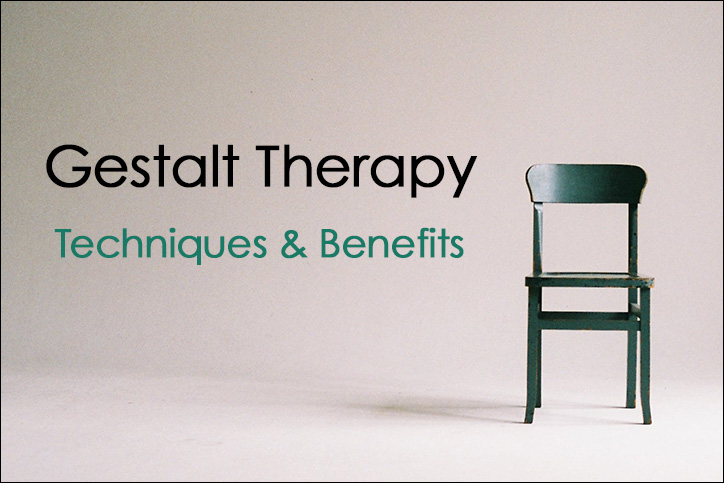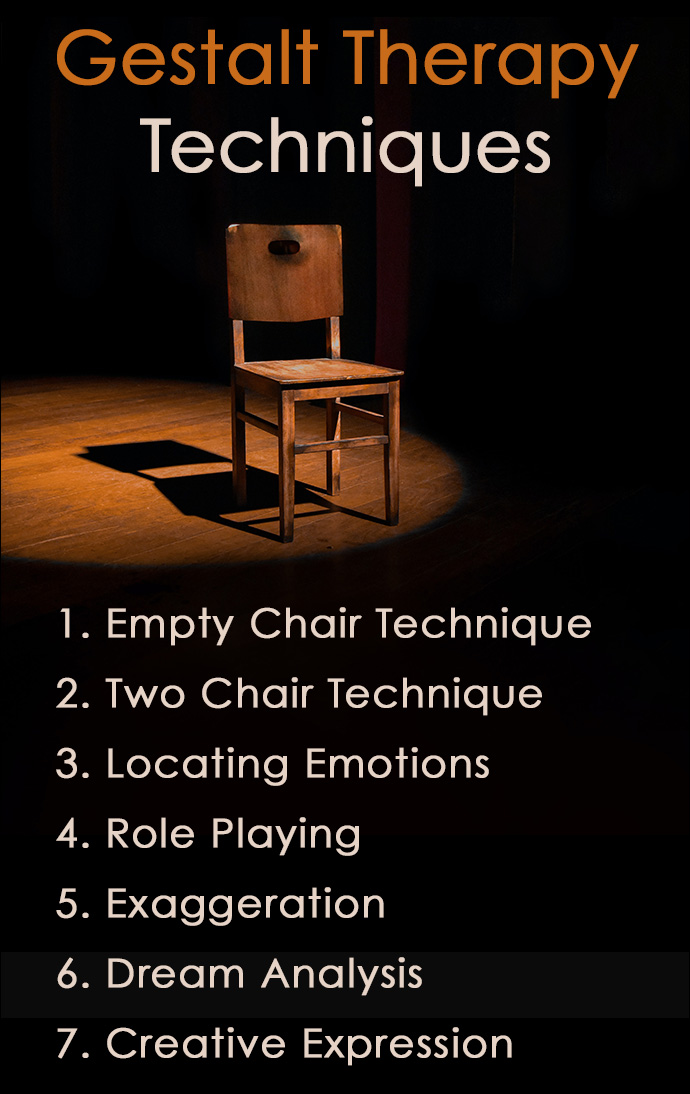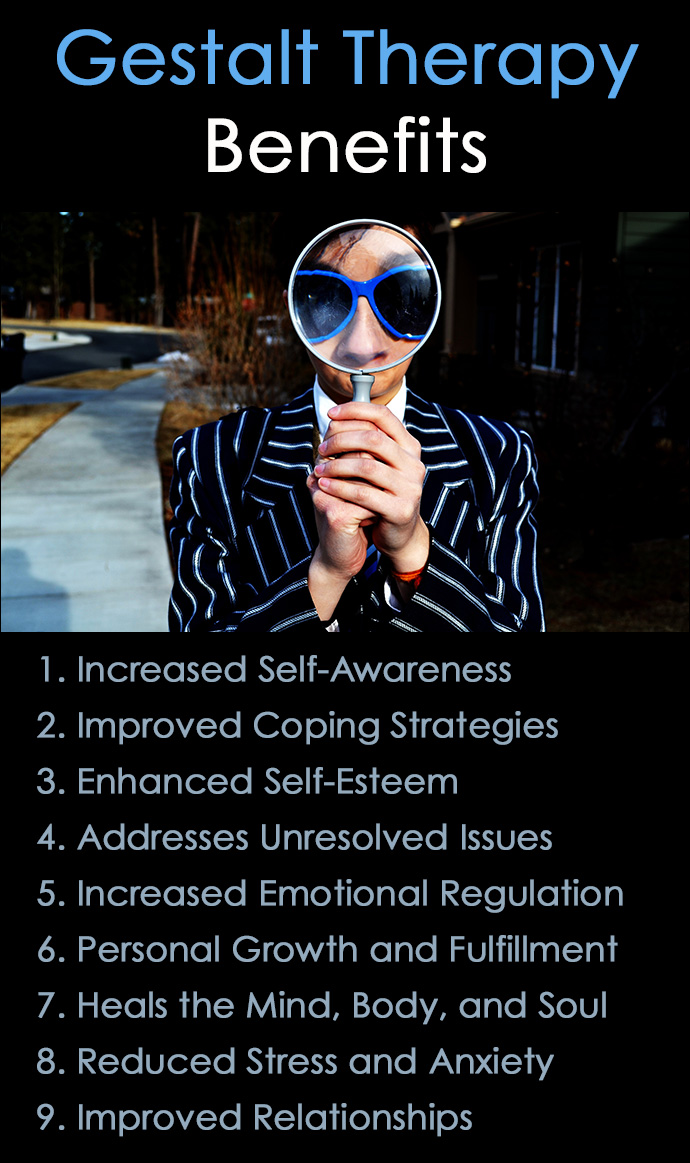Table of Contents
Gestalt Therapy is a powerful and holistic client-centered psychotherapy approach that offers techniques and benefits for treating mental health conditions and addiction.
It focuses on the here and now by emphasizing self-awareness and personal responsibility.
Understanding Gestalt Therapy techniques and how this treatment method works can help individuals overcome mental health conditions like anxiety, depression, and even substance use disorders.
What is Gestalt Therapy?
Gestalt therapy is form of psychotherapy developed by Fritz Perls, his wife Laura, and Paul Goodman in the 1940s, that focuses on a person’s growth, self-awareness, and his or her own personal experiences.
Gestalt Therapy Principles
There are several core principles or concepts that are unique to this type of therapy.
1. The Whole Person
Gestalt therapy sees an individual as a whole person and considers how their thoughts, feelings, and behaviors all work together.
2. Present Moment
This therapy approach focuses on the “here and now “ instead of the past and encourages each person to explore his or her current feelings, thoughts, and experiences in the present moment.
3. Self-Awareness
This form of therapy aims to cultivate a perception of self-awareness so individuals have a better understanding of their emotions, thoughts, and behaviors.
4. Responsibility
Each person learning Gestalt therapy techniques is encouraged to take ownership of their actions, decisions, and feelings to promote personal responsibility of daily life.
Gestalt Therapy Techniques
Gestalt therapy techniques are designed to help people explore their inner thoughts and emotions.
Therapy can take place in one-on-one or group sessions and it’s important that each client or patient feels safe about exploring their experiences without judgment from others.
Examples of Gestalt Therapy Techniques and Exercises
1. Empty Chair Technique
“Empty Chair” is a technique that allows a person to imagine having a conversation with another person while sitting in front of an empty chair.
The person is encouraged to imagine speaking to a friend or parent in the empty chair about their thoughts and feelings.
This technique is helpful for confronting unresolved issues and inner conflicts.
2. Two Chair Technique
The “Two Chair Technique” is similar to the Empty Chair technique, except in this case, the client or patient takes on both roles of the dialogue between the two chairs.
This exercise is helpful for identifying and resolving internal conflicts, such as an inner voice, or external conflicts with another person.
It promotes healing by gaining an understanding of feelings and conflicts that are causing issues and finding solutions to resolve them.
3. Locating Emotions
“Locating Emotions” is an awareness exercise that guides an individual to pay attention to physical sensations in the body related to thoughts and emotions in the present moment.
Emotions like stress and anxiety can cause physical sensations that lead to tightness in the chest or butterflies in the stomach.
The goal is to promote self-awareness and understand how the body reacts to negative feelings and emotions to process them in healthier ways.
4. Role Playing
There are many Role Playing techniques in Gestalt therapy and one type is to re-enact stressful events or relationships from the past to pinpoint how they had a negative impact on emotions and behaviors.
This type of role playing exercise provides a new perspective on past experiences to offer healthier alternatives.
5. Exaggeration
The Exaggeration Technique targets physical body movements or behaviors a person exhibits that are related to emotions. Examples include avoiding eye contact, tapping a foot, bouncing a leg, or twirling hair.
After identifying the behavior, the client is asked to exaggerate it to bring attention to the movement and describe the emotions attached to it.
This technique helps uncover hidden feelings and increases awareness of the behavior to overcome it in the future.
6. Dream Analysis
During Dream Analysis, a person is asked to recount a recent dream and describe it in the present moment as if it is happening in the here and now. Rather than attempt to interpret the meaning of the dream, an individual acts out various parts of the dream.
By exploring people and objects in the dream, it can reveal symbolism related to a person’s persona that offers insight into the subconscious mind and unresolved issues.
7. Creative Expression
Using art, music, or other creative forms of expression is a productive way for a person communicate their thoughts and feelings through self-exploration.
Creative expression helps to stay in the present moment and leads to a greater awareness of a person’s current emotions.
Gestalt Therapy is Helpful for Treating a Variety of Conditions
Gestalt Therapy is beneficial for addressing a wide range of emotional and psychological mental health issues, including addiction.
1. Anxiety Disorders
This therapy approach helps individuals identify the underlying causes of anxiety and develop coping strategies to increase self-awareness and manage many types of anxiety symptoms.
2. Relationship Issues
This form of therapy is particularly effective for couples or individuals experiencing conflicts in their relationships. It helps to improve communication, resolve issues, and build healthier relationships.
3. Depression
By encouraging clients to explore their emotions and unhealthy thought patterns, it can help individuals with certain kinds of depression regain a sense of joy in life.
4. Self-Esteem and Self-Identity
Gestalt therapy techniques empower individuals to explore and discover their true self, which can lead to improved self-esteem and a more fulfilling life.
5. Trauma and Post-Traumatic Stress Disorder (PTSD)
Gestalt therapy allows clients to effectively process past traumatic events and reduce the emotional impact of trauma and PTSD by using practical coping strategies.
6. Substance Dependence and Addiction
By addressing the underlying emotional and psychological issues that contribute to drug or alcohol addiction, it is extremely useful for supporting individuals in recovery.
7. Eating Disorders
This form of therapy can be beneficial for helping people with eating disorders identify underlying emotional issues and develop a healthier relationship with food and eating.
8. Grief and Loss
Gestalt therapy assists individuals to better process grief or loss and enables them to successfully move through the stages of grief to find closure.
The Benefits of Gestalt Therapy
Gestalt therapy offers numerous benefits to individuals seeking to expand their personal growth and heal emotionally.
Here are 9 Gestalt Therapy Benefits
1. Increased Self-Awareness
Individuals learn ways to explore their thoughts, feelings, and behaviors, which leads to a deeper understanding of their personal self-awareness and motivations.
2. Improved Coping Strategies
Clients and patients learn effective ways to deal with stress, anxiety, and other emotional challenges to enhance their ability to navigate daily life challenges.
3. Enhanced Self-Esteem
By promoting acceptance and authenticity, Gestalt therapy can enhance a person’s sense of self-esteem and self-worth.
4. Addresses Unresolved Issues
Gestalt therapy addresses ways for individuals to address past traumatic events and unresolved issues that promote emotional healing.
5. Increased Emotional Regulation
Individuals learn to effectively identify and manage emotions to reduce impulsive and destructive behaviors that serve as the root cause of many mental health issues and addiction.
6. Personal Growth and Fulfillment
Gestalt therapy helps individuals reach their full potential and live a more meaningful and satisfying life through personal growth and fulfillment.
7. Heals the Mind, Body, and Soul
By addressing the mind, body, and soul, Gestalt therapy offers a holistic approach to personal healing and development.
8. Reduced Stress and Anxiety
Learning exercises and techniques to reduce stress and anxiety leads to a calmer and more balanced life that has a positive impact on mental health and recovery.
9. Improved Relationships
Gestalt therapy enhances communication, empathy, and understanding for people experiencing interpersonal conflicts to create healthier relationships.
Gestalt Therapy for Substance Addiction
Gestalt therapy can be a valuable approach for treating substance use disorders and addiction.
This form of therapy addresses addictive behaviors as well as the underlying emotional issues that contribute to drug and alcohol addiction.
1. Understanding Triggers and Cravings
Gestalt therapy teaches individuals to explore many of the thoughts, emotions, and behaviors that are associated with alcohol and drug cravings and triggers.
By understanding the root causes of addictive behaviors, individuals learn to recognize and manage triggers more effectively when they occur.
2. Exploring Root Causes
Addiction often stems from unresolved pain, emotional issues, or trauma. Gestalt therapy offers tools to explore the past and uncover the underlying causes to heal and grow.
3. Promoting Self-Awareness
Self-awareness is one of the core principles of Gestalt therapy. It teaches individuals to become more aware of their thoughts, emotions, and physical sensations that may lead to unhealthy consequences.
4. Developing Coping Strategies
Gestalt therapy equips individuals with effective coping strategies for dealing with stress, anxiety, and other triggers that may lead to substance abuse and addiction.
5. Enhancing Emotional Regulation
Addiction often involves using substances as a way to numb or cope with unhealthy emotions. Gestalt therapy helps clients build healthier emotional regulation skills instead of using substances to cope with the problem.
6. Identifying and Challenging Distorted Beliefs
Many individuals struggling with addiction have distorted beliefs about his or her personal self. Gestalt therapy works to identify and challenge these beliefs and replaces them with healthier and more realistic beliefs.
7. Promoting Responsibility and Accountability
Denial and avoidance of personal responsibility are hallmarks of addiction. Gestalt therapy encourages individuals to take ownership of their actions and the consequences of their addiction to promote personal responsibility and accountability.
8. Addressing Co-Occurring Issues
Many people dealing with substance use addiction also struggle with co-occurring disorders such as depression, anxiety, or PTSD. Gestalt therapy addresses all of these issues simultaneously to provide a holistic approach to addiction treatment.
This type of therapy is often used in conjunction with other treatment modalities for addiction, such as Cognitive Behavioral Therapy (CBT).
It empowers individuals to gain insight into their addictive behaviors, make positive changes, and work towards lasting recovery.
Combined with its focus on self-awareness, personal responsibility, and exploration of underlying issues, Gestalt therapy is a valuable component of a comprehensive mental health and addiction treatment plan.





